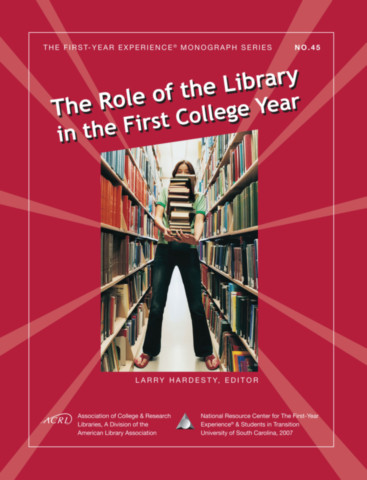

Published in partnership with the Association of College and Research Libraries, a division of the American Library Association
Foreword—Alan E. Guskin
Preface: Drawing on the Past, in the Present, to Shape the Future of the First-Year Experience in American Higher Education—John N. Gardner & Andrew K. Koch
Introduction—Larry L. Hardesty
Section 1 Foundations
1) Recent History and Definition of Information Literacy and Future Directions—Thomas G. Kirk, Jr.
2) Engaging Students in the First College Year: Why Academic Librarians Matter—George D. Kuh, Polly D. Boruff-Jones, & Amy E. Mark
3) How First-Year College Students Use Their Time: Implications for Library and Information Literacy Instruction—Leticia Oseguera
Section 2 Initiatives
4) Models of Library Instruction for First-Year Students—Debbie Malone & Carol Videon
5) The Library and First-Year Seminars: In-Depth Analysis—of a 2001 National Study
Colleen Boff & Kristin Johnson
6) Information Literacy and the First-Year Experience in the California State University System—Ilene F. Rockman
7) Librarians With a First-Year Focus: Exploring an Emerging Position—Colleen Boff, Cheryl Albrecht, & Alison Armstrong
8) Strategies for Designing Assignments to Support Information Literacy Initiatives—Larry L. Hardesty
Chapter 9) Engaging First-Year Students: Developing Library-Related Cocurricular Activities That Impact and Empower Students—Ellysa Stern Cahoy & Loanne Snavely
Section 3 Connections
10) Assessing Library Instruction in the First College Year—Robert Fitzpatrick & Randy L. Swing
11) Research on Student Retention and Implications for Library Involvement—Cindy Pierard & Kathryn Graves
12) The Convergence of Information Literacy and the First-Year Experience: Looking to the Future—Larry L. Hardesty
Section 4 Campus Case Studies
Case Study 1
The Library and the First-Year Experience Over Time at Dickinson College—Christine Bombaro & John C. Stachacz
Case Study 2
Collaborative Curriculum Building at Millikin University: The Critical Role of Faculty/Library Collaboration—Susan Avery & Nancy DeJoy
Case Study 3
Transformations: Library/Faculty Collaboration in First-Year Programs at IUPUI—William A. Orme & Barbara D. Jackson
Case Study 4
Librarians as Change Agents: The Evolution of a First-Year Information Fluency Program at a Small Liberal Arts College—Teresa Fishel, Beth Hillemann, & Jean Beccone
Case Study 5
Developing a First-Year Information Literacy Program: The Contexts and Challenges of Change—Randall Schroeder & Judith Griffith
Case Study 6
Integrating Information Literacy Into a Discipline-Specific Course in the First Year: A Case Study of Sociology 101—Kathy S. Kremer & Karen Shostrom Lehmann
Case Study 7
Reducing Library Anxiety Through Career Explorations at Eastern Kentucky—Linda Klein
Case Study 8
Using Web-Based Instruction Guides to Teach Information Literacy Concepts to First-Year Students at Grinnell College—Catherine Rod & Rebecca Stuhr
Case Study 9
Emergence/Emergency? The Earlham Libraries and the First-Year Experience—Neal Baker & Thomas G. Kirk, Jr.
Case Study 10
Librarians in the Wired Classroom: The Seton Hall University Experience—Mary McAleer Balkun, Beth Bloom, & Marta Mestrovic Deyrup
Case Study 11
The Development and Management of the Online Information Literacy Tutorial at the HKUST Library—Sam Chu
Case Study 12
Preparing Pathways to Information Literacy: Combining Research Technology, and Core College Competencies for Select First-Year Students—Joan Campbell, Corrine Taylor, & Pattie Orr
Case Study 13
A Common Grading Rubric: Evolution of Library Assignments for an Orientation Course—Janice Hovis & Diane Savoca
Appendix A: Information Literacy Competency Standards for Higher Education Association of College and Research Libraries
Appendix B: Objectives for Information Literacy Instruction: A Model Statement for Academic Librarians
Association of College and Research Libraries
About the Contributors